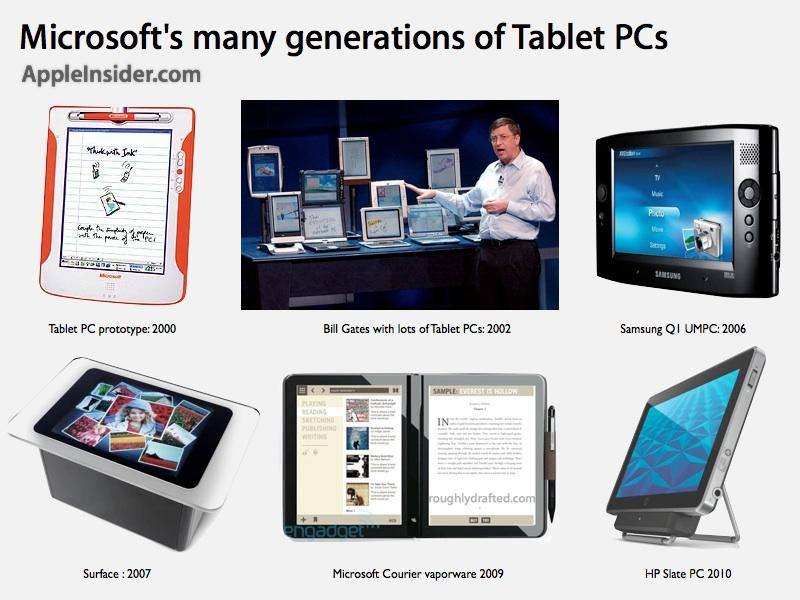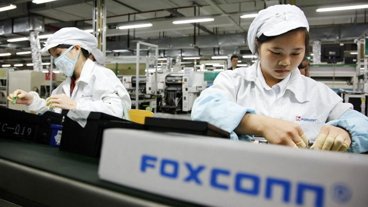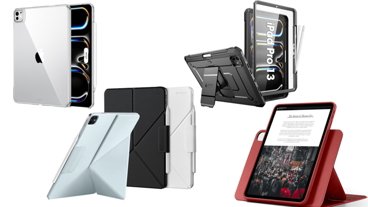Microsoft gearing up to reintroduce iPad competitors running Windows 7
According to a report by New York Times, "Microsoft’s chief executive [Steve Ballmer] is expected to announce a number of these devices when he takes the stage at CES, showcasing devices built by Samsung and Dell, among a number of other manufacturing partners."
The report said that the new crop of Slate PCs include a model from Samsung "similar in size and shape to the Apple iPad, although it is not as thin. It also includes a unique and slick keyboard that slides out from below for easy typing."
Samsung already sells its Android-based Galaxy Tab, but that 7 inch device ">isn't designed
Microsoft hopes to bring Windows 7 to market to serve as a contender in the table market, which is currently dominated by Apple's iPad. Without time to develop a new operating system or adapt its fledgling Windows Phone 7 to work on full sized devices, the company is falling back to a strategy that pairs the conventional Windows 7 desktop in landscape mode with a new "layered interface that will appear when the keyboard is hidden and the device is held in a portrait mode," the report stated.
No focus on apps
While the large library of custom iPad apps delivers much of the allure connected to Apple's tablet, Microsoft is following Google's Chrome OS strategy of relying on HTML5 to unlock the value of partner's new devices. The report cited "a person who works at Microsoft" as saying that "the company was encouraging partners to build applications for these devices that use HTML5."
The same source said that "applications will not be sold in an app store, as with the Apple iTunes model, but Microsoft will encourage software partners to host the applications on their own Web sites, which will then be highlighted in a search interface on the slate computers. It is unclear if these applications will be ready for CES as most are still in production."
Microsoft similarly downplayed the importance of available third party software when launching Windows Phone 7, claiming that smartphone users don't want to be distracted with lots of functionality in their mobile phone. Claiming the same thing about tablet computers will be harder to do, but the new devices' backward compatibility with conventional Windows apps will make this less necessary.
Lots of Tablet PC failure: 2001-2005
Microsoft began touting "Pen Computing" in the early 90s, at a time when Apple was bringing its Newton Message Pad to market. Stylus-based tablet never caught on outside of a brief flurry of cheap PDAs offered by companies like Palm.
In 2000, just as the promising PDA market was reaching its peak, Microsoft debuted the Tablet PC as a "new" concept, in an effort to sell desktop Windows to mobile users.
While Palm converted its PDA business to smartphones, Microsoft's Tablet PCs never garnered much attention. Near the end of 2001, Bill Gates claimed that Microsoft's Tablet PC would become the most popular form of PC in five years, but that never happened.
A year later at the end of 2002, even Gartner was reporting that "despite much publicity and market promotion, the Tablet PC is not expected to result in a high rate of early adoption."
The firm wrote at the time that "a lack of application support, clumsy hardware designs and a price premium will be barriers for most users," but still predicted that "by 2007 at least 35 percent of all notebooks sold will have screen digitizers with a convertible or separable keyboard design." Even that conservative five year prediction didn't pan out.
UMPC Origami tablet failure: 2006
In 2006, Microsoft relaunched Tablet PCs as part of Project Origami, resulting in a category of products the company named UMPC (for "ultra mobile"). The primary UMPC device was Samsung's $1300 Q1, which ran both Windows XP (upgradable to Vista) as well as Microsoft's mobile Windows CE (since rebranded as "Windows XP Embedded" to escape the stigma of Windows CE's past failures.)
In 2006, Gartner said that it believed Microsoft's UMPC was rushed to market and "assigned a probability of 80% to the UMPC not achieving mainstream success (sales in the millions of units) by 2009," according to a report made at the time by Pen Computing.
That same year, CNET UK pitted the Samsung Q1 against a decade old Newton MessagePad 2000 from 1997 and pronounced the Newton as a better mobile device overall.
Surface, Courier and the Slate PC: 2007-2009
In 2007, Microsoft turned its attention to touch-based desktop PCs as Apple released the first iPhone, later unveiling the Microsoft Surface prototype. Apple continued to broaden its reach into the tablet market with the iPod touch, which delivered much of the functionality of a tablet while only claiming to be an entertainment device.
In 2009, Microsoft floated prototype pictures of the Courier, a dual screen tablet device that was supposed to support both multitouch and stylus input, and run the same software as Windows Phone 7 (at least according to the imagination of the company's fans). Microsoft officially scuttled the project in 2010.
In 2010, Microsoft once again focused on Tablet PCs, this time under the name Slate PC, showing off a prototype of an HP Slate running Windows 7. That device ended up selling just 9,000 units as Apple's full sized iPad began selling into the millions.
 Daniel Eran Dilger
Daniel Eran Dilger














 Amber Neely
Amber Neely
 Thomas Sibilly
Thomas Sibilly
 AppleInsider Staff
AppleInsider Staff
 William Gallagher
William Gallagher
 Malcolm Owen
Malcolm Owen
 Christine McKee
Christine McKee










79 Comments
If it's true that only 9000 HP slates were sold then that's pretty astoundingly bad.
I expected the HP slate to sell much better than that, but didn't expect it to rival the iPad.
MS should look at the real sales figures of the HP slate and evaluate them objectively. If it really is selling that poorly they need to quit trying to sell slates based of Win 7 and move on to developing Win 7 series mobile for a slate device. Frankly I'm surprised they haven't done this already.
If this is indeed true, then this is more indication the Microsoft doesn't understand what is making the iPad a success: namely the applications specifically designed with the iPad in mind, instead of taking desktop applications and shoe-horning them into a device not designed for them.
Is this indication that Microsoft has lost touch with the market, or that they are so busy trying to sell to businesses that they haven't noticed the influence of the consumer market on certain business choices.
You forget how fugly some of this crap was until you see Bill Gates standing next to it at CES from 10 years ago.
Where do you start to comment on this?
MS product development has really come off the rails, with one "Hail Mary" after another. I have visions of Balmer either freaking out on people who don't know what to do, or he is sitting in his office saying "Whatever" to any product development person that comes in the door. I get the distinct impression that he has given up, and just wants something to say, no matter how unlikely it will succeed or actually work, at these CES gatherings.
He must know he is in a bad position, wants to take the money and run, but has to do this for the board members, at least one more time.
I can hardly wait for the tell all book that some employee with write one day, and his management is all laid out in can't look away cringing detail. I will read it on my ipad.
The larger a company gets, the harder it is to make decisive choices that leave the familiar. Microsoft just hasn't been able to give up their bread and butter. I wonder if there would ever be a future where the tech world paradigm has shifted so much and Apple just keeps thinking iOS is the solution for everything. This is hard to imagine, but if you had told me how much Microsoft would fall just 5 years ago, I would have called you crazy. And i've been a die hard mac fan since the early 90's.
Does anyone in the entire world really believe that you can just add touch capability to a desktop operating system, and everything will be okay? Sure.... ship that running on a phone...or a pda...or a slate...or a pony. It wasn't designed for it, but hey, Windows isn't technically 'designed' for any specific hardware configuration so no big deal right? Wrong.